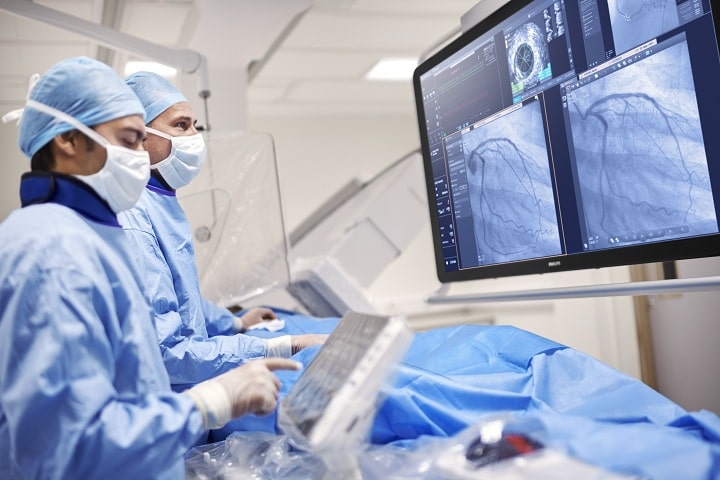Royal Philips, a global leader in health technology, today announced late-breaking results of a large-scale, real-world analysis of U.S. Centers for Medicare & Medicaid Services (CMS) data on the rates of guideline adherence and associated mortality in patients with CIED infection [1]. Results were presented at the American College of Cardiology’s 71st Annual Scientific Session by Sean Pokorney, M.D., Assistant Professor of Medicine at Duke University School of Medicine (U.S.) and member of the Duke Clinical Research Institute. The data demonstrated that approximately 4 in 5 patients are not treated according to HRS/EHRA Class I consensus recommendations and guidelines for CIED infection (full system extraction)[2,3]. Moreover, complete hardware removal (extraction) within 6 days was associated with a 42.9% lower risk of death compared with patients who did not undergo extraction.
The study examined 1,065,549 patients in Medicare in the USA who received a CIED between January 1, 2006 and December 31, 2019. Patients included in the CIED infection group were those that had an implant greater than 12 months old, had a primary diagnosis for infection of a device implant, and had documented antibiotic therapy. The study was an independent analysis conducted by Duke University and supported by a research grant from Philips. Philips had no role in the design or conduct of the analysis.
“This study highlights the life-threatening nature of device infections and the significant opportunities to improve care in these complex patients. The findings also emphasize the importance of timely diagnosis and complete treatment. Making things better for patients tomorrow will require working with clinicians across various specialties to advance education to help diagnose CIED infections and deliver timely care,” said Jonathan P. Piccini, MD., M.H.S., the lead investigator of the study, the Director of Cardiac Electrophysiology section at the Duke Heart Center. “The opportunity to ensure all patients have access to guideline-recommended care is not only imperative, but life-saving for patients across the world.”
CIEDs are life-saving devices and improve quality of life for many patients. Each year one million CIEDs are implanted worldwide [4] (which include pacemakers, implantable cardioverter-defibrillators and cardiac resynchronization devices). However, one in 20 of these patients will develop a CIED infection [5] within three years. Patients diagnosed with CIED infections are often treated with antibiotics, which is not an effective treatment option alone – 50-100% of patients treated with only antibiotics will experience an infection relapse [6,7]. Often medical professionals lack awareness and experience in CIED infection management resulting in patients being misdiagnosed or receiving suboptimal treatments which can lead to negative health outcomes. Current clinical practice guidelines recommend extraction for all patients with a definite CIED infection, including complete device and lead removal. It is estimated that globally more than 16,000 CIED patient lives are at risk each year due to improper treatment. CIED extraction is proven safe and effective, especially with earlier diagnosis, which can reduce mortality rates and long-term costs.
“This CIED Infection Medicare Study clearly demonstrates that increasing adherence to Class I guideline care can potentially save lives,” said Chris Landon, Senior Vice President and General Manager Image Guided Therapy Devices at Philips. “At Philips, we are committed to supporting evidence-based medical approaches and innovating solutions to help physicians improve outcomes and decrease mortality for CIED infection.”
Philips lead management solutions
Lead extraction, when indicated, is a highly successful, potentially life-saving procedure, with a clinical success rate of 97.7% and a procedural safety rate of 99.72% [10]. When lead extraction is indicated, Philips supports physicians with Lead Management solutions through a broad portfolio of tools designed for safety and predictability, including both laser and mechanical lead extraction devices. Philips is dedicated to helping physicians manage every lead safely, predictably, and responsibly by providing expert tools, training, and ongoing support.
About Royal Philips
Royal Philips is a leading health technology company focused on improving people’s health and well-being, and enabling better outcomes across the health continuum – from healthy living and prevention, to diagnosis, treatment and home care. Philips leverages advanced technology and deep clinical and consumer insights to deliver integrated solutions. Headquartered in the Netherlands, the company is a leader in diagnostic imaging, image-guided therapy, patient monitoring and health informatics, as well as in consumer health and home care. Philips generated 2021 sales of EUR 17.2 billion and employs approximately 78,000 employees with sales and services in more than 100 countries.


















